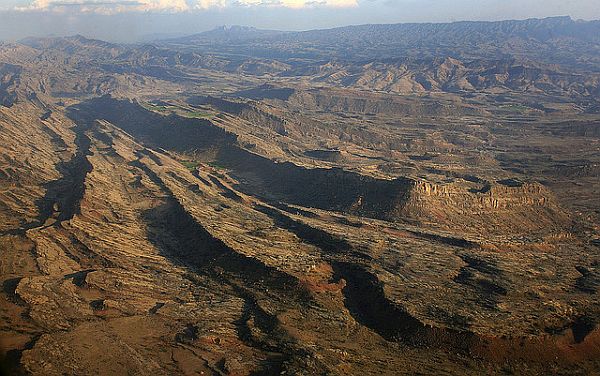 After three Frontier Corps soldiers were killed in a NATO helicopter attack on a Pakistani border post last week, the Pakistani government cut off supplies to Afghanistan by closing the Torkham border crossing. It was the easiest way of sending a message to Washington that killing Pakistani soldiers is unacceptable.
After three Frontier Corps soldiers were killed in a NATO helicopter attack on a Pakistani border post last week, the Pakistani government cut off supplies to Afghanistan by closing the Torkham border crossing. It was the easiest way of sending a message to Washington that killing Pakistani soldiers is unacceptable.
The Washington Post‘s editorial page now shoots back: “[Pakistan’s] resistance to a more muscular U.S. campaign in North Waziristan, where the Haqqani faction is based, is unacceptable.”
So what’s the Obama administration going to do? Show the Pakistanis who’s the boss and threaten to cut off aid to a country currently dealing with an environmental catastrophe worse than the 2004 Asian Tsunami?
For those with an imperial mindset (like the editors of the Washington Post) the issue here is about who has the right and the power to exercise their will. America, land of the righteous, savior of the world, must prevail.
But America’s real military problem is not it’s inability to restore a global consensus about the supremacy of its military might. America’s problem is topography.
It’s because of topography that “Pakistan has a veto over President Barack Obama’s military strategy in Afghanistan.”
It’s because of topography that the border between Pakistan and Afghanistan is a contrivance that the Taliban can freely use to their advantage.
Though thanks to Vietnam’s jungles, quagmire remains the metaphor of choice when we talk about unwinnable wars, a more appropriate metaphor for what is now glibly referred to as Af-Pak is The Labyrinth.

When the Pentagon saw it’s opportunity to vanquish the ghost of Vietnam, it knew what it was looking for: a great big cumbersome army in a wide open space.
Victory against Saddam in Kuwait was a foregone conclusion — even if it’s debatable exactly what the US proved when it demonstrated its ability to slaughter thousands.
The Washington Post now sees itself as a valiant bugler leading the charge in the next phase of what it swiftly, justifiably but also cynically dubbed “Obama’s war”. But like all the war’s proponent, it is a victim of an irresistible illusion: that will-power can move mountains. Others have tried — and the mountains are still there.

What will be accomplished by the latest call for what is euphemistically described as a more “muscular” approach in Waziristan is the further reinforcement of a view of America already widely held in Pakistan.
As Mosharraf Zaidi points out:
There is no ideological commitment or religious fervor that fuels the Pakistani public’s anti-Americanism. Nor is there a particularly civilizational flavor to it. Pakistani anti-Americanism comes from a sustained narrative in which Pakistan is the undignified and humiliated recipient of U.S. financial support — provided at the expense of Pakistani blood.
As narratives go, this comes closer to the truth than its comic-book counterpart: the war of necessity (in which Obama heads in deeper on his search for the way out).


“Victory against Saddam in Kuwait was a foregone conclusion — even if it’s debatable exactly what the US proved when it demonstrated its ability to slaughter thousands.”
The US proved that the IDF’s reputation as an army is grossly over rated, as slaughtering fuzzy-wussies is so very easy when you are the imperial western power or its lackey.
Is it not ironic that Pakistan — the nation that played a crucial a role in vanquishing the Soviets in Afghanistan — is now seen as an enemy?
International Zionism has long had the goal of breaking up Pakistan and neutralizing its nuclear deterrent.
Looking more and more like the campaign to “bomb Iran” was mainly a diversion designed to hide the main goal of bringing Pakistan to heel.
It is time for all the Warmongers & lackeys, to put on the uniform of choice, go to the front lines and prove how invincible they are, not just with their mouth sending others to fight. I’m sure that there are enough blowhards in the country that can replace all the present members of our Military forces, though probably not in efficiency. Doesn’t matter, at least the country would be rid of their noise, the P.O.T.U.S. can hand out metals made by the Federal Reserve to the dependents in lieu of any insurance benefits. I might add, that the rest of the C.E.O.’s of all the so called big business enterprises can go too, along with Wall Street. One fell swoop, then close down all the Military bases the U.S. has, bring home the troops, seal the borders, rebuild the Country once again to the greatness it once was. I could go on, but, seeing this is only an old mans fantasy, why?
god bless Hyatt …
Unfortunately, Pakistan’s closure of the Khyber Pass was only a warning to the US not to take the country for granted. Since it clearly hasn’t worked there should be a plan B sometime soon.
The Pakistanis are opening up more to China — the Gwadar port being a good example — as a counterweight.
Actually China would be a much better friend than the US would ever be, because they also provide another front to the Kashmir dispute with India. China would have no difficulty with the ISI running an Afghan government as long as it kept the crazies away from the Xinjiang frontier. Of course, the Pakistanis know this, so the Washington Post can sharpen its imperial pencil in readiness — the futility of their rants will at least amuse America’s enemies.